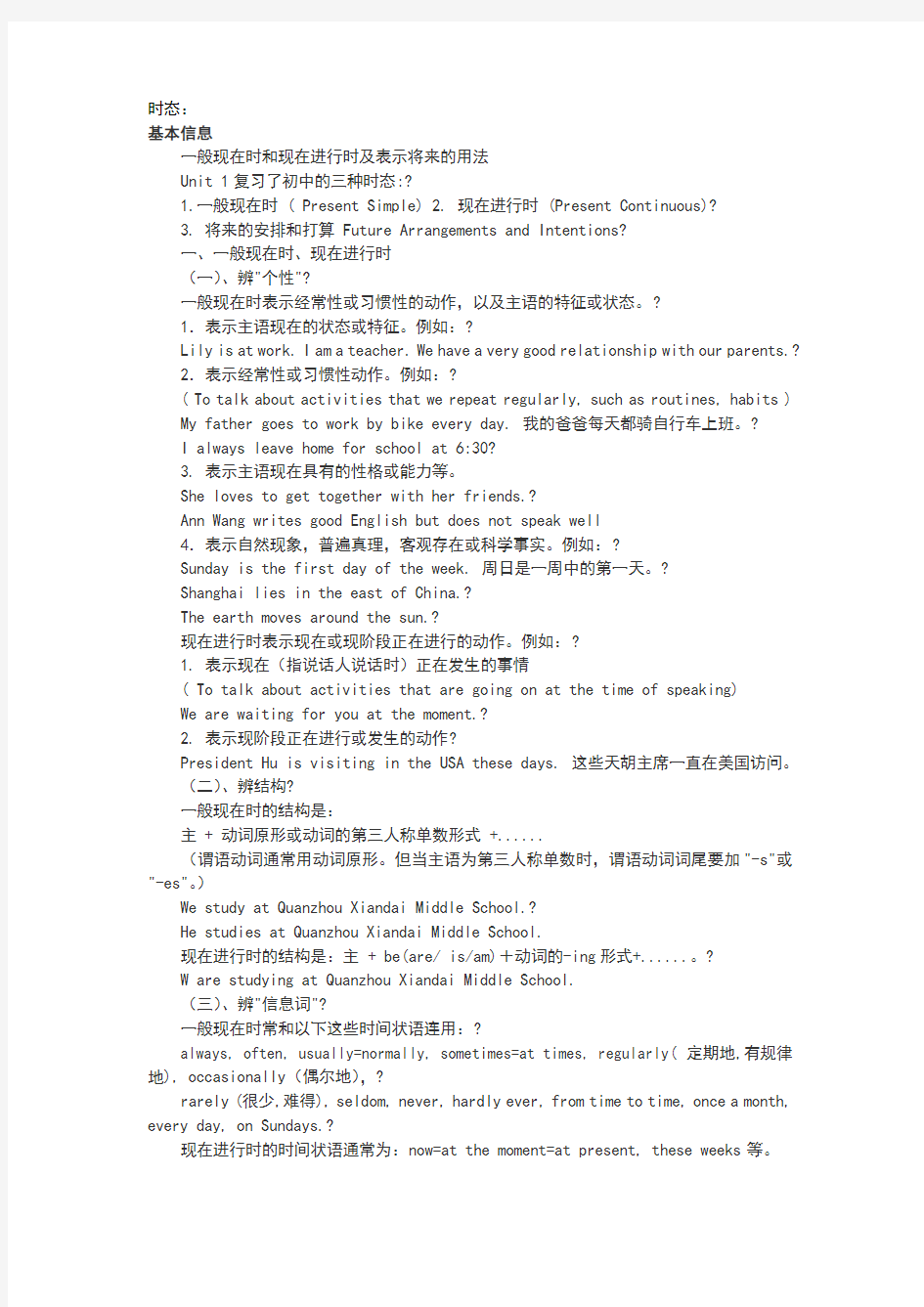般现在时和现在进行时及表示将来的用法


时态:
基本信息
一般现在时和现在进行时及表示将来的用法
Unit 1复习了初中的三种时态:?
1.一般现在时 ( Present Simple)
2. 现在进行时 (Present Continuous)?
3. 将来的安排和打算 Future Arrangements and Intentions?
一、一般现在时、现在进行时
(一)、辨"个性"?
一般现在时表示经常性或习惯性的动作,以及主语的特征或状态。?
1.表示主语现在的状态或特征。例如:?
Lily is at work. I am a teacher. We have a very good relationship with our parents.?
2.表示经常性或习惯性动作。例如:?
( To talk about activities that we repeat regularly, such as routines, habits ) My father goes to work by bike every day. 我的爸爸每天都骑自行车上班。?
I always leave home for school at 6:30?
3. 表示主语现在具有的性格或能力等。
She loves to get together with her friends.?
Ann Wang writes good English but does not speak well
4.表示自然现象,普遍真理,客观存在或科学事实。例如:?
Sunday is the first day of the week. 周日是一周中的第一天。?
Shanghai lies in the east of China.?
The earth moves around the sun.?
现在进行时表示现在或现阶段正在进行的动作。例如:?
1. 表示现在(指说话人说话时)正在发生的事情
( To talk about activities that are going on at the time of speaking)
We are waiting for you at the moment.?
2. 表示现阶段正在进行或发生的动作?
President Hu is visiting in the USA these days. 这些天胡主席一直在美国访问。
(二)、辨结构?
一般现在时的结构是:
主 + 动词原形或动词的第三人称单数形式 +......
(谓语动词通常用动词原形。但当主语为第三人称单数时,谓语动词词尾要加"-s"或"-es"。)
We study at Quanzhou Xiandai Middle School.?
He studies at Quanzhou Xiandai Middle School.
现在进行时的结构是:主 + be(are/ is/am)+动词的-ing形式+......。?
W are studying at Quanzhou Xiandai Middle School.
(三)、辨"信息词"?
一般现在时常和以下这些时间状语连用:?
always, often, usually=normally, sometimes=at times, regularly(定期地,有规律地), occasionally(偶尔地),?
rarely (很少,难得), seldom, never, hardly ever, from time to time, once a month, every day, on Sundays.?
现在进行时的时间状语通常为:now=at the moment=at present, these weeks等。
也可以和look, listen等提示性的动词连用。试比较:?
Sometimes they have lunch at home. 他们有时在家吃午饭。?
They are having lunch at home now. 他们现在正在家吃午饭。?
二、将来时的表达方法:表示将来发生的动作或存在的状态。
1. will/shall + 动词的原形:是将来时最普通的表达法, 表示“单纯的将来”
I will be sixteen years old next month.?
Will I he get angry if I tell him the truth
2. be going to + 动词的原形, 表达“打算”或“预测”
1) 表示“打算”, 主语的意图,即将做某事 to express an intention to do something?
What are you going to be when you grow up?
I am going to buy a mobile phone.?
2) 计划,安排要发生的事 The play is going to be produced next month.?
3) 表示“预测” to make a prediction about a future event because of something we can observe
It looks as if it is going to rain. Look at the sky, it is going t be very nice.?
My sister is going to have a baby.
3. 一般现在时表示将来:表示时间表上已经确定好或安排好的事情
表示在规定的时间里会发生的事情,常用来表示生日, 日历, 课时安排,交通时刻表(车次、航班何时出发或到达)、电视节目何时开始等。
( to talk about official events or timetables which we cannot change)?
The train leaves at 7 o’clock tomorrow morning. The bus starts in ten minutes.
The summer term begins on the 15th of February. The planes arrives early in the evening.?
1)下列动词:come, go, arrive, leave, start, begin, return的一般现在时表将来。
这主要用来表示在时间上已确定或安排好的事情。?
The train leaves at six tomorrow morning. When does the bus star It stars in ten minutes.?
2)在时间或条件句中, 用一般现在时表示将来的动作
When Bill comes (不是will come), ask him to wait for me.?
I'll write to you as soon as I arrive there.?
4)在动词hope, take care (保重), make sure等后。?
I hope they have a nice time next week.?
Make sure that the windows are closed before you leave the room.
4. 现在进行时表示将来:常有"意图"、"安排"或"打算"的含义
这种用法比较生动,给人一种期待感。它常表示最近或较近的将来,所使用的动词多是转移动词
常用词为 come, go, start, arrive, leave, stay
I'm going. 我就要走了。 We're leaving for Beijing tomorrow. 我们明天就去北京。?
When are you starting 你们什么时候动身?
They are coming here this afternoon. 他们今天下午来这儿。
...........
